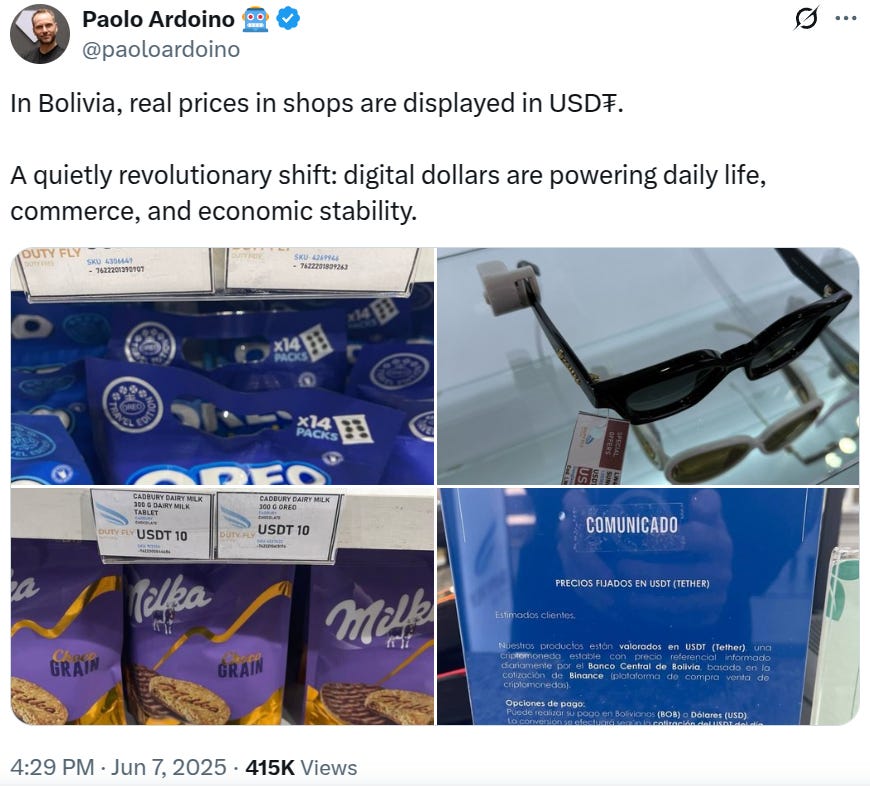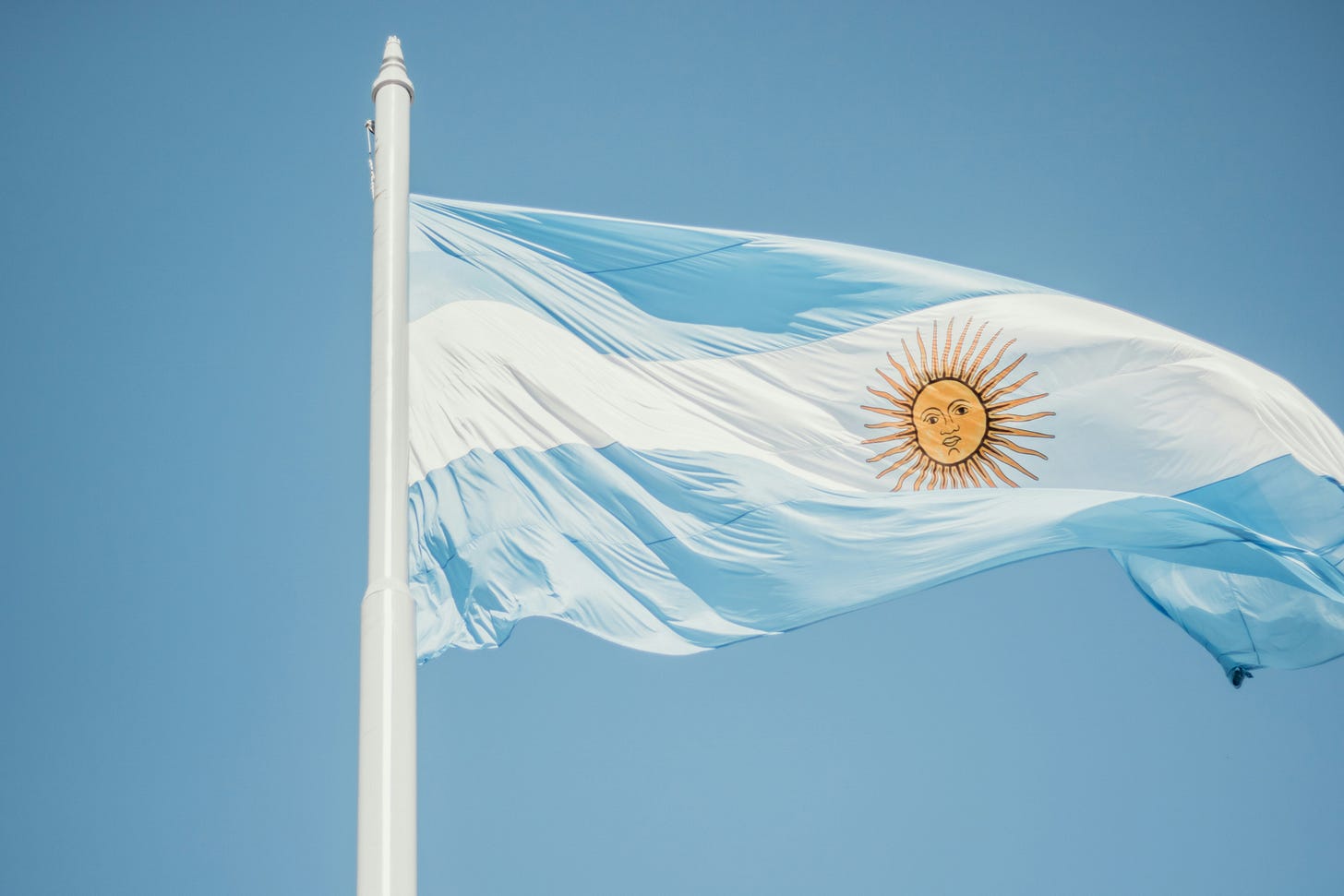Latam Crypto Report #24: A New Crop of Agriculture and Energy Projects
Also: Bolivia's crypto milestone; $LIBRA updates
¡Hola a todos! 👋
Welcome back to the 🌎Latam Crypto Report, where contributor Kristin Majcher compiles and analyzes the biggest crypto stories in the region. In this edition, we’ll take a look at the news from mid-May to early July.
Whether you’ve been cooling off from the recent summer heatwave in New York, braving record cold temperatures in Buenos Aires or joining us from anywhere else in the world, we hope our analysis of crypto news in Latin America helps you make sense of this dynamic region.
In this edition, we’ll cover:
A new crop of crypto-related agriculture and energy projects
Bolivia’s historic year in crypto
Updates on the $LIBRA probe in Argentina
If you were forwarded this email, please hit the “subscribe” button below and share our reports with your friends. Feel free to follow Kristin on LinkedIn to share crypto news or discuss new projects.
Also, be sure to check out Aaron’s recent podcast interview with Josh Solesbury of ParaFi Capital discussing the big picture cross-border stablecoin opportunity in Latin America.
And if you’re so inclined feel free to join the BCR/LCR reader Telegram group.
Now, let’s get into the news. If you’re not subscribed already, please hit the button below!👇
Latin America Sees a New Crop of Tokenized Agriculture, Energy Projects
Photo by Steven Weeks on Unsplash
In the past few months, we’ve seen a noticeable number of headlines relating to emerging crypto projects tied to the agriculture and energy industries in the region. While these items aren’t necessarily indicative of a bigger trend, it’s worth taking a look at the whole picture.
Here are some recent crypto announcements in the agriculture and energy space:
Unblock, a startup that transforms waste gas from the Vaca Muerta shale formation into computing power for activities such as mining crypto, has raised $13.5 million in a seed round. (Bloomberg Línea, Bloomberg, La Nación)
Tether signed a memorandum of understanding (MOU) with agroindustrial company Adecoagro to “explore a strategic collaboration focused on bitcoin mining,” following news in late April that it had acquired 70% of the company (Tether press release, The Block, CoinDesk)
Local rice producers in Panama are using blockchain technology in a project led by the Inter-American Development Bank (IDB) and Panama’s Ministry of Agricultural Development. (BeInCrypto)
Ripple and Mercy Corps Ventures have launched a blockchain pilot program aimed at boosting income opportunities for small farmers in Colombia. (BeInCrypto, Bitcoin.com, Ripple press release)
Latam Crypto Report is presented by
Avenia is the programmable financial infrastructure for Latin America. Connect to local payment rails like PIX, SPEI and CBU — using stablecoins as settlement — and unlock real-time, cross-border payments without banks, FX desks, or SWIFT.
Whether you're building a wallet, a crypto card, or a global treasury solution, Avenia gives you the APIs and compliance-ready infrastructure to scale in LatAm. Move money between BRL, USD, MXN and more — fast, transparent, and fully on-chain.
Bolivia Marks a Year of Changing Course on Crypto
Facing a worsening financial crisis, Bolivia reversed a longstanding ban on crypto just more than a year ago.
We here at the LATAM Crypto Report have been following these developments since the early days, covering topics including an uptick in digital asset trading in the months following the announcement.
In light of this milestone, here’s a breakdown of some of the most important crypto developments in Bolivia in the past few months:
A June 27 report from Bolivia’s central bank shows that digital asset transactions grew from $46.5 million in the first half of 2024 to $294 million in a comparable period this year, representing an increase of about 530%.
The country saw a cumulative transaction volume of $430 million since the decision was implemented, the report said.
Small businesses in Bolivia have been turning to digital assets such as Tether (USDT) and bitcoin, Reuters pointed out.
Banks have started offering clients USDT services. For example, Banco de Crédito de Bolivia (BCP) now allows users to convert local currency to USDT to make international transactions in dollars. Banco Bisa also offers USDT custody services.
Bolivia is also pursuing a CBDC, which we should have more details about in the coming months. (Cointelegraph)
A viral post on X/Twitter from Tether’s Paolo Ardoino drew a flurry of attention from the crypto world to USDT adoption in Bolivia.
With upcoming elections and a bicentennial celebration in August, we can expect Bolivia to have a busy year ahead. We’ll be watching to see how the country’s crypto adoption continues to develop alongside these key developments.
Argentina’s $LIBRA Probe Wraps Up, But Questions Remain
Photo by Angelica Reyes on Unsplash
Headlines on Argentina’s $LIBRA meme coin scandal — which dominated crypto news in February — have died down in the past few months. However, there have still been some important updates worth catching up on since our last newsletter.
A government probe concluded in early June that Argentina’s President Javier Milei did not break any ethics laws after posting about the $LIBRA meme coin on social media. (CriptoFacil, Cointelegraph, Buenos Aires Herald, Ámbito, The Block, Portal do Bitcoin)
The decision came after Milei dissolved the specialized unit responsible for investigating the incident. (El País, Bloomberg, The Block, Cointelegraph)
Meanwhile, Kelsier Ventures CEO Hayden Davis denied scam allegations in a declaration filed before a New York court handling a class-action lawsuit. (Buenos Aires Herald, La Nación)
The court froze $57.65 million in Circle (USDC) stablecoins allegedly linked to $LIBRA. (Cointelegraph, El País, Portal do Bitcoin, Livecoins)
Certain aspects of this story are still developing, so be sure to check back next time for updates.
🗞 Latin America Crypto News Rundown
Here’s where we break down Latin America crypto headlines from the past few weeks, organized by country and region. If you don’t see a country listed, it’s simply due to the news flow during a particular week.
Regional News
Crypto exchange Mercado Bitcoin announced plans to tokenize more than $200 million in real-world assets (RWAs). (BeInCrypto, CoinDesk)
Brazil’s Méliuz now holds the most bitcoin of any public company in Latin America after its holdings reached 595.67, surpassing e-commerce giant Mercado Libre. (Brazil Crypto Report, CoinDesk, BeInCrypto, Reuters)
Mercado Libre held just more than 570 bitcoins as of May, its first quarter 2025 report showed. The company’s CEO Marcos Galperin announced he will be stepping away from his role on January 1, 2026. He will become executive chairman and focus on areas including product development and strategy. (Mercado Libre press release, BeInCrypto, CriptoNoticias, Bloomberg Línea)
An oil and gas facility in Latin America was purchased using stablecoins and tokenized debt and equity by Feniix Energy using the RWA platform Global Settlement. The company claims it’s the first time a fully tokenized capital stack has been used to acquire real estate tied to commodity production. (CoinDesk)
Crypto payment card firm Baanx announced support for BNB across the UK, EU and Latam markets. (CoinDesk)
Bloomberg Línea explores what a new U.S. remittance tax could mean for crypto companies in Latin America. (Bloomberg Línea)
Portal do Bitcoin takes a look at the top public companies holding bitcoin in Latin America. (Portal do Bitcoin)
BeInCrypto explores why crypto payments have taken off in Latin America. (BeInCrypto)
The new Latin American Federation of Bitcoiners has already added 39 communities in 16 countries. (BeInCrypto, CriptoNoticias)
Kraken is expanding its reach in Latin America, enabling local payment rails in Argentina and Mexico so that users in those two countries can deposit local currencies to use on the platform. (Kraken press release)
El País examines what Trump’s crypto policies could mean for the adoption of blockchain and crypto in Latin America. (El País)
Livecoins looks at how institutions and companies are using stablecoins in the region. (Livecoins)
Banco Santander is considering offering its retail customers access to crypto and launching a stablecoin, Bloomberg reported. (Bloomberg, Cointelegraph)
South America
🇦🇷 Argentina
Binance will celebrate its 8th anniversary in Buenos Aires on July 14. (iProUP, iProfesional)
World partnered with Rappi to offer a home delivery service for its iris-scanning orbs in two Buenos Aires neighborhoods. (BeInCrypto, Cointelegraph)
Authorities reportedly seized $330,000 worth of crypto and arrested an individual in Buenos Aires for their alleged involvement in a series of crypto-related scams (Infobae, BeInCrypto)
Argentina blocked access to cryptocurrency exchange HTX. (BeInCrypto, Bitcoin.com)
A Bitget study sheds new light on the profile of crypto investors in Argentina. (BeInCrypto)
🇨🇱 Chile
Chile will start requiring data on crypto transactions exceeding $1,000 this month to comply with the so-called “travel rule”. (La Tercera, BeInCrypto)
Tether made a strategic investment in Chilean exchange OrionX. (Tether press release, Cointelegraph, CoinDesk)
Chilean authorities detained 52 people with suspected ties to the Tren de Aragua transnational criminal organization, who were accused of laundering and moving $13.5 million with crypto. (Livecoins, CriptoNoticias, DW)
Chile’s Supreme Court dismissed a lawsuit from three crypto companies that accused banks of engaging in anticompetitive practices. (BeInCrypto, La Tercera)
🇨🇴 Colombia
A new Finnovista study expects stablecoin adoption by fintechs to grow significantly in the coming years. (CriptoNoticias)
The town of Cicuco is using blockchain for issuing residency certificates. (Cointelegraph, BeInCrypto)
Colombia’s tax authority is preparing new measures to regulate online gambling and crypto transactions. (Infobae, La República)
Interpol issued a red notice for the suspected leader of the Daily Cop crypto scam. (BeInCrypto, Infobae, El Espectador)
🇵🇾 Paraguay
Hackers took over Paraguayan President Santiago Peña’s X account to post a fake message about making bitcoin legal tender. They also leaked personal data about citizens, prompting the country to heighten its cybersecurity efforts.
(Cointelegraph, Bloomberg, OCCRP, BeInCrypto, Portal do Bitcoin, Livecoins, CriptoFacil)
KULR Technology Group deployed 3,570 bitcoin mining machines at its facilities in Asunción. (KULR press release, CriptoNoticias)
Hive Digital reached a key exahash milestone and completed the first phase of its Yguazú site. (Hive Digital press release, BeInCrypto)
🇵🇪 Peru
Binance predicts that close to 2 million in Peru will be using crypto by the end of 2025. (BeInCrypto, La República)
🇻🇪 Venezuela
Authorities arrested an individual accused of committing fraud through HV IJEX, a collapsed crypto platform under investigation for being a scam. (BeInCrypto)
Crypto platform El Dorado closed in Venezuela. (El Dorado blog, BeInCrypto, CriptoNoticias)
Central America, Mexico & Caribbean
🇨🇷 Costa Rica
A bill including legislation that would regulate virtual asset service providers (VASPs) is advancing in the country’s Legislative Assembly. (The Tico Times, BeInCrypto)
🇬🇹 Guatemala
The president of Guatemala’s central bank and others held a preliminary discussion about congresswoman Shirley Rivera’s crypto regulation bill. (BeInCrypto, Congress announcement)
Banco Industrial integrated SukuPay in its mobile app to power cross-border payments. (CoinDesk, BeInCrypto, Cointelegraph)
🇵🇦 Panama
Panama City Mayor Mayer Mizrachi has informally floated creating a bitcoin reserve and raised the idea of prioritizing ships paying in bitcoin on the Panama Canal. However, it is unclear whether either of those ideas could turn into firm proposals. (CoinDesk, Cointelegraph, BeInCrypto)
Panama and Italy are partnering to combat crypto crimes. (BeInCrypto)
Towerbank presented its Ikigii app at Panama Blockchain Week. (BeInCrypto)
🇲🇽 Mexico
Mexico has a high potential for crypto but needs to have clear regulations, Binance’s regional VP for Latin America Guilherme Nazar told El Universal. (El Universal, BeInCrypto)
World launched its Build LATAM program to support startups. (BeInCrypto)
The Federal Electricity Commission has fined the Mexican Union of Electricians over allegations that electricity was being stolen at one of its installations to power illicit crypto mines. (CriptoNoticias, Proceso)
🇺🇸🇵🇷 Puerto Rico
The U.S. Department of Justice (DOJ) charged two people who allegedly ran the $650 million OmegaPro Ponzi scheme. (CoinDesk, U.S. Attorney’s Office)
🇸🇻 El Salvador
The International Monetary Fund (IMF) said in late May it had reached an agreement with El Salvador for a nearly $120 million payment, under the condition that it wind down its involvement with the Chivo wallet by July. (IMF press release, Cointelegraph)
In mid-June, El Salvador had bought 240 bitcoins since its deal with the IMF to scale back its bitcoin involvement, Cointelegraph reported. The government is still buying the cryptocurrency. (Cointelegraph, Portal do Bitcoin)
US Democratic senators have proposed a bill that would impose sanctions on certain Salvadoran government officials, which would require a report on El Salvador’s crypto purchases. Bukele responded with an X post in which he appeared to ridicule the measure, saying that the lawmakers were “just salty.” (Decrypt, Bitcoin.com, Criptonoticias)





